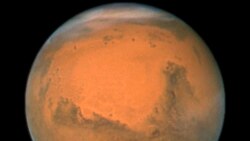Geologist Finds Evidence That Mars Was Once Warmer and Wetter Than It Is Today
Geologist Gregory Retallack from the University of Oregon, studied images of the Martian landscape as well as mineral and chemical data that were both captured and sent to Earth by the Mars Rover, Curiosity. The images and data revealed that the soil he studied dated back to some 3.7 billion years ago, providing him with evidence that Mars was once, a long time ago, a much warmer and wetter planet than it is today. Professor Retallack joins us today to talk about his research and how Mars, at one time, could have been habitable. Also… The Ebola outbreak in West Africa, so far, has claimed hundreds of lives and infected even many more. Officials at the U.S. Centers for Disease Control and Prevention and other international health agencies are working hard to reduce the spread of the infection. New proposed rules to cut pollution from the 600 coal-fired power plants here in the United States are generating a heated debate. Those who are for or against the new rules are making sure that the US Environmental Protection Agency knows just how they feel before any new rules are enacted. There is good news and bad news in the fight against malaria. First the bad news: Research indicates drug-resistant malaria is spreading across Southeast Asia. The good news: a new anti-malarial drug looks promising in an early test. We’ll learn about the “FabLab” at Kenya's University of Nairobi and its role in using 3-D prototyping to spark a manufacturing revolution throughout the country. Officials with the European Space Agency say its Rosetta spacecraft will soon reach the comet it has been chasing for the past ten years. And we’ll hear what the space agency is hoping to learn from its up-close study and hoped-for landing on the comet. These stories and more are coming up for you on VOA's science, health and technology magazine, "Science World."
Episodes
-
![]() February 12, 2024
February 12, 2024Science in a Minute: Mystery of Snowball Earth May Have Been Cracked
-
![]() February 06, 2024
February 06, 2024Science in a Minute: CERN New and Bigger Atom Smasher on the Way
-
![]() February 05, 2024
February 05, 2024Science in a Minute: NASA's PACE Mission
-
![]() January 31, 2024
January 31, 2024Science in a Minute: The Shrinking Wrinkled Moon












